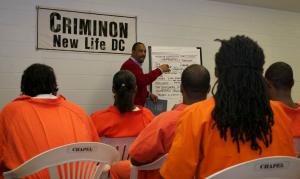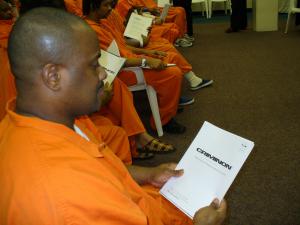Will new law help keep our communities safer?
Too many inmates have left prison a “better criminal” than when they entered, due to the severe lack of vocational and education programs
“There is no person alive who cannot make a new beginning.”
”
WASHINGTON, DISTRICT OF COLUMBIA, UNITED STATES, January 24, 2019 /EINPresswire.com/ -- Editorial written by John Stanard— L. Ron Hubbard, The Way to Happiness
A new era has emerged for criminal justice by the recent signing into law of the criminal justice bill called the FIRST STEP Act. With this new law, which implements key vocational and educational programs for inmates in federal prisons, we hope that the high rate of inmates returning to prison across the country will be improved.
For years there has been controversy over the fact that inmates in detention facilities and federal prisons do not have access to rehabilitative programs. Our communities are endangered when offenders are released with little or no vocational skills or the ability to earn a living. Often times an incarcerated person serves time and is released a “better criminal” than when he or she entered. We all benefit when a returning citizen re-enters society with life skills enabling him or her to be a productive citizen.
Washington, DC, like many areas in the country, suffers from a high rate of incarcerated persons returning to prison within a few years. Up to 75% of offenders were rearrested within 5 years according to a 2014 Bureau of Justice Statistics study which covered 30 states. [1] Many people working in the criminal justice field believe that it will take a cooperative effort between government, nonprofit and faith-based organizations to effect real change.
Perhaps, The FIRST STEP Act, signed into law by President Trump on Friday, December 21st 2018, which seeks to provide the many needed programs to federal prisoners to reduce the risk of recidivism, will begin this new change.
These programs are based on the belief that all men have value and that anyone can turn their lives around and make a better life.
As the National Director for Social Betterment Policy and Programs for the Church of Scientology National Affairs Office, and national criminal justice reform advocate, I feel that the FIRST STEP Act is a move in the right direction. Our criminal justice system needs to adopt positive approaches towards those who have been imprisoned. We need to make available useful programs that provide training and skills to allow individuals to lead productive lives post-incarceration. The FIRST STEP Act provides funding for such programming as well as a mechanism to reward those who take advantage of that programming.
The programs provided for in the FIRST STEP Act provide the services that prisoners need in order to make the changes and gain the skills they need to become better prepared for reentry as successful and contributing members of society. These services can range from literacy training and general education to specific job training and programs to improve their outlook on living productive lives. One such program which has been active both nationally and internationally is Criminon, www.Criminon.org, an international non-profit dedicated to the rehabilitation of criminals through a suite of secular educational life skills programs based on the works of author, humanitarian and philanthropist, L. Ron Hubbard.
Matt Robinson, president of Criminon New Life DC said that their work in the Washington, DC, Detention Facility over the last 15 years has been rewarding and successes from those incarcerated are very encouraging. One participant recently told them, for example, that since he started the Criminon program, ‘It has elevated my thinking. I no longer place the blame on others for the wrong that went on [in] my life. I no longer run from reality. I embrace it and look for solutions to fix the situation.’”
The motto of Criminon is taken from the book The Way to Happiness, (www.thewaytohappiness.org) by L. Ron Hubbard, in which he writes, “There is no person alive who cannot make a new beginning.” Mr. Hubbard also stated that, “A criminal career always begins at the moment when the criminal-to-be loses his self-respect,” and that is what Criminon addresses with this program.
Criminon is supported by the Church of Scientology and its parishioners, and has gotten 23,000 inmates through the program in 23 countries across the globe.
We will all be hoping for real change in the criminal justice field to ensure that the recidivism rates (when a convicted criminal reoffends) are reversed and more inmates are honestly rehabilitated.
Notes
[1] Durose, Matthew R., Alexia D. Cooper, and Howard N. Snyder, Recidivism of Prisoners Released in 30 States in 2005: Patterns from 2005 to 2010 (pdf, 31 pages), Bureau of Justice Statistics Special Report, April 2014, NCJ 244205.
John Stanard
National Affairs Office
+1 2026676404
email us here
Legal Disclaimer:
EIN Presswire provides this news content "as is" without warranty of any kind. We do not accept any responsibility or liability for the accuracy, content, images, videos, licenses, completeness, legality, or reliability of the information contained in this article. If you have any complaints or copyright issues related to this article, kindly contact the author above.


